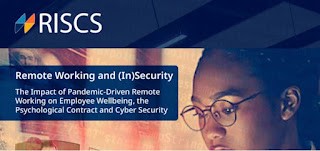CDT in Cyber Security for the Everyday: a multi-disciplinary perspective Lizzie Coles-Kemp and Rikke Bjerg Jensen
Since the turn of the 21st Century, the subject of information security has experienced growing diversification both at a practice (industry and government) and at an academic level. This move towards increased diversity is reflected in the funding calls, the interests of our MSc and PhD students and in the research challenges presented by many of our key stakeholders. Whilst information security still maintains a strong information and technology protection focus, this now sits alongside a broader mission of securing people, technology and society in a digital world. This process of extending both the scope of, and the approach to, our research and teaching, whilst upholding a strong connection with our data and technology protection roots, is illustrated particularly clearly in the story of our Centre for Doctoral Training (CDT) in Cyber Security.
This year, with
our first CDT having just taken its final cohort, we were delighted to be
successful in the latest round of funding for UKRI centres for doctoral
training. With this new award, we are able to launch a CDT in Cyber Security for the Everyday, with
the first cohort due to start in September 2019. This is a truly multi-disciplinary
initiative that brings together students from the mathematical sciences with
those from the social sciences and humanities, by focusing on two main
challenges:
·
Security
of emerging technologies, which addresses the security research challenges
presented by technological evolution.
·
Securing
cyber societies, which addresses the security research challenges that emerge
from increasingly connected societies.
In bringing these two challenge areas into one CDT, we are developing the ISG’s
tradition of high quality research in technology and data protection as well as
demonstrating our ability to lead emergent research in the securing of people,
communities and society at large in a world that is becoming more connected and
increasingly digital.
The success of
this CDT application lay, in part, in our ability to build upon on-going,
successful supervisory partnerships with colleagues from a wide range of
disciplines and departments across Royal Holloway. Our
previous CDT established strong connections with Computer Science, Geography,
Psychology and the School of Law. At the same time, the ISG was also involved
in the Leverhulme funded Doctoral Training Centre (DTC) on Freedoms and the Rights of the Individual in a Digital Age where,
in addition to working with our CDT collaborators, we developed supervisory
partnerships with Media Arts, Politics and International Relations and
Classics. In envisioning and developing the CDT in Cyber Security for the
Everyday, we combined these two supervisory networks with the broader
supervisory capacity of the ISG. We did so to establish a foundation upon which
a spectrum of PhD studies ranging from single-discipline studies that have an
appreciation of wider disciplinary positions to the fully multi-disciplinary
can be encouraged and supported. Establishing successful supervisory teams for
this new CDT therefore builds on cross-departmental conversations and
collaborations, as well as on the existing knowledge and experience held within
the ISG.
Such a broad
network produces diverse supervisory teams and challenges the way we navigate
and undertake PhD supervision. From our experience with existing
multi-disciplinary supervisory teams we have learned that these work best when
they start from a shared and clearly expressed goal for the PhD study that is
also shared by the student. This therefore also necessitates continuous
conversations about disciplinary positions and methodological approaches
throughout the PhD. Whilst each supervisor and the student will typically bring
very different strengths, skills and knowledge to the PhD study, it is
important that each contribution clearly supports the shared goal and values
the different disciplinary perspectives
A
multi-disciplinary PhD offers student and supervisors alike with the
opportunity of a new and exciting study, but it can also be risky as there is
no well-trodden path stretching out before the team. As such, supervisors must
construct safe and supportive spaces in which not only students but also supervisors
can experiment with new knowledge, work with different and sometimes
conflicting bodies of literature and theory and explore new methods of
research. Ideally, a multi-disciplinary PhD should result in a collaborative
and rewarding learning experience for all involved. This is reinforced through
a network of supervisory support mechanisms, such as workshops, courses and
training sessions facilitated through the CDT.
In our new CDT,
we are looking forward to welcoming additional colleagues into our network and
establishing new supervisory teams. Not only shall we be working further on our
approaches to multi-disciplinary PhD supervision but also learning from each
other and our student cohorts as to what security education and training is
needed for this type of multi-disciplinary programme. This is important so that
the new CDT becomes a space that supports a wide spectrum of
multi-disciplinarity; from single-disciplinary approaches with an appreciation
for wider disciplinary positions to fully interdisciplinary PhD studies. Hence,
a multi-disciplinary approach to PhD supervision, whilst not replacing the more
traditional approach, extends and broadens the ways in which cyber security is
researched and taught. The research challenges posed by the march of
digitalisation require us all, whether student or supervisor, to reflect,
respond and renew our research approaches and skills to successfully respond to
the emerging cyber security research challenges enmesh themselves in everyday
life.


Comments
Post a Comment